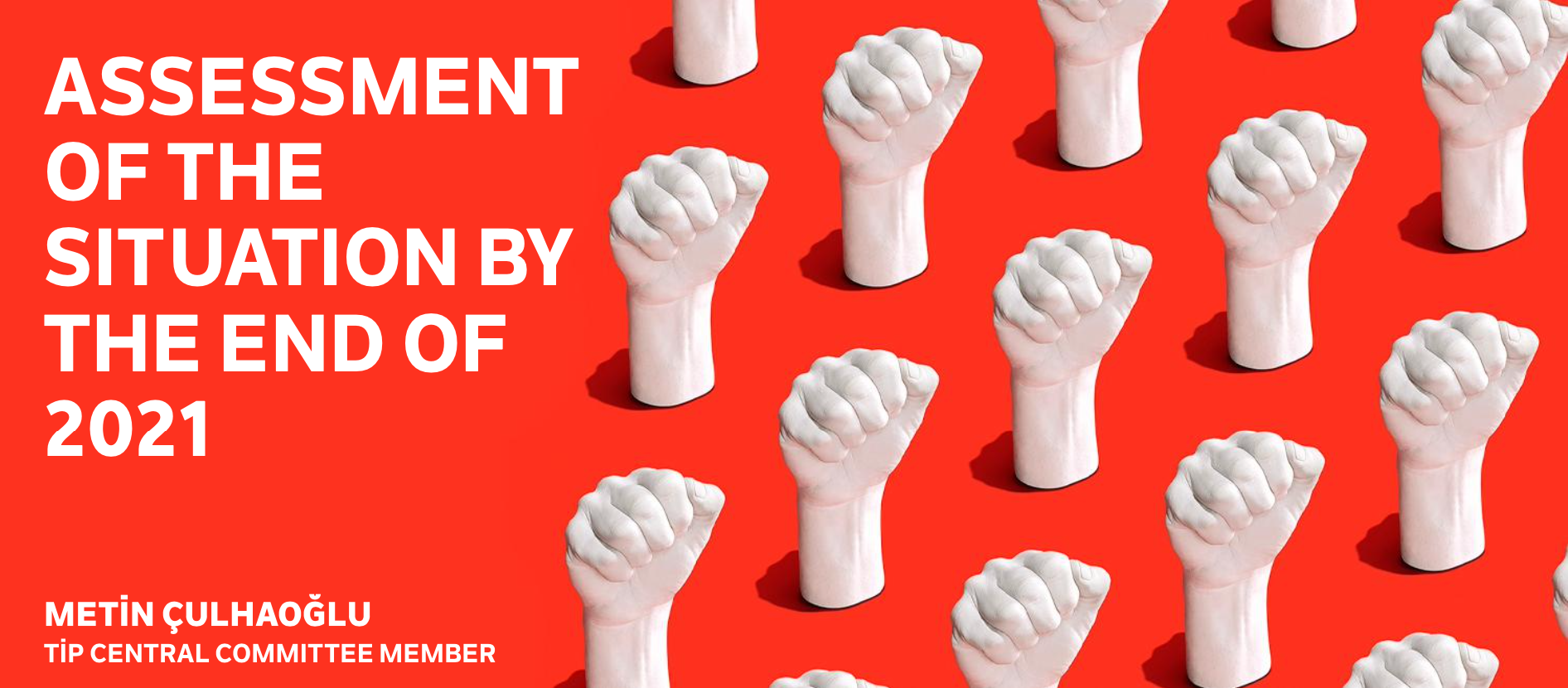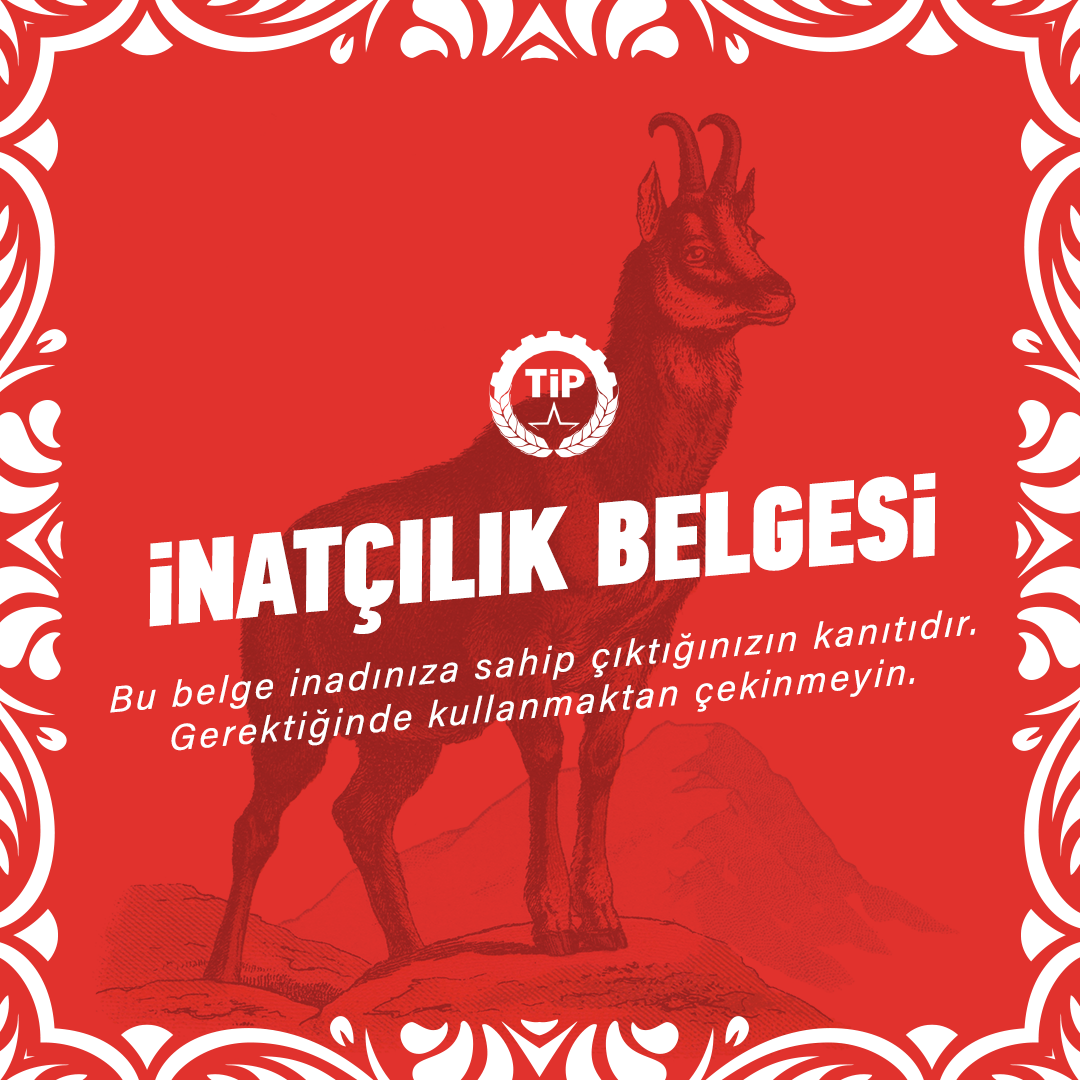Metin Çulhaoğlu
TİP Central Committee member
As we approach the end of 2021, what can be said about the political situation in Turkey in general?
It seems that today’s situation can be explained as a bilateral “stalemate”. On the one side stands the current regime represented by the AKP-MHP alliance. This is where the primary stalemate is seen to lie. If we define the other side as the ‘people’s alliance’ led by the CHP and the Good Party (İYİP), which claims to be the ‘alternative to the government’, then we could say that another ‘deadlock’ is present. We will try to discuss what kind of deadlock is present on this front later.
The deadlock of the regime
The regime is experiencing a deadlock in the sense of “not being able to do what it used to do”, in all aspects of politics without exception, and is facing difficulties in sustaining itself.
The country’s economic administration is completely out of control. The only thing that is certain in the economy is that Tayyip Erdogan has the final say, but beyond that one can only guess who is in charge of what or what steps are currently being taken. Any decision taken in the economic sphere serves only to survive one day longer.
The model based on the inflow of hot money that made Turkey an attractive field for international capital to invest in, allowing capital access to areas where it was previously not allowed to, cheap labor, creating new areas of rent and enriching certain capital centers – a model that mostly worked for a while – eventually ran into its limits. At the same time as the general recession of world capitalism, this situation is manifested in rising prices, high living costs, financial difficulties, devaluation of the TL, falling real incomes due to rising inflation and rising unemployment.
In summary, the pre-existing structural weaknesses of Turkish capitalism have become radicalized and chronic because of the regime’s economic policies and preferences.
***
One of the areas in which the 20-years of AKP government has been most fortunate has been in foreign policy, particularly in terms of relations with the Western world.
Since its inception and especially after coming to power, the AKP has been a ‘favorite’ of the US and the EU and has enjoyed open support from this front. For a time, both the EU and AKP administrations played a mutual game in the prospect of ‘full EU membership’ for Turkey, even though both sides knew that this would never happen. Crucially, the AKP successfully wore this membership prospect through in domestic policy and it was successful.
When ‘EU membership’ turned out to be a pipe dream, the regime saw that it had plenty of room for maneuver and made the most of this flexibility and mobility. Moreover, the influx of refugees as a result of the Syrian war has given it additional leverage. The threat of “unchaining” 3-4 million refugees in Turkey into Europe has been used repeatedly, while the regime’s foreign policy has been shaped by shifts back and forth from NATO membership to buying Russian S-400s, flirting with Putin to supporting Ukraine, expressing loyalty to NATO to “Eurasian” tendencies.
But when it comes to foreign policy, while these opportunities are not entirely exhausted, some of them have almost reached their limit.
Two factors can be said to have played a role in reaching these limits, along with calling the regime’s bluff.
Firstly, the Biden administration’s policy of ‘correcting’ Trump’s extremely pragmatic and unprincipled policies, which have drawn the ire of the ancient capitalist countries of continental Europe, and of creating an image of respect for human rights, is also putting pressure on the regime in Turkey. Secondly: the capitalist class in Turkey is connected to and dependent on the West, both in terms of the flow of foreign resources and in terms of import-export relations. Thus, any “adjustment” in this area will at some point mean a violation of the ‘red lines’ of the capitalist class.
And that is also almost the end of the road.
***
Another important aspect of the regime’s deadlock concerns the “image” that the regime wants to impose on the country.
The AKP administration and today’s regime has “tinkered”, manipulated, and corrupted all the established norms, rules and structures through which Turkish capitalism has been transformed politically, ideologically, culturally and administratively; but it has not been able to replace them with any stable and sustainable alternative.
In other words, while the republic succeeded in establishing a new order in 1923 to replace the Ottoman order, the AKP and the regime, after twenty years of power, failed to replace the familiar and in many ways stable republic with another “republic”. Today Turkey suffers from a hybridization of the republican acquis, which seems impossible to scrape off, and the new, predominantly religious new image that is being imposed on it.
Such hybridization seems impossible to maintain.
The opposition’s own ‘deadlock’
Although we have used the word “deadlock”, the problem facing the “people’s alliance” is the disproportion or asymmetry between the current state of the country and their “remedies” and “solutions”.
We have discussed the point to which the regime has brought the country and the resulting “hybridization”. While this conjuncture requires radical and widespread “adjustments,” even to return to the “old Republic,” the national alliance limits itself to “opposition to the one-man regime” and to solutions such as “strengthened parliamentarism.”
It is as if abolishing the “one-man” system and “strengthened parliamentarism” will solve all problems, from the corruption of the education system to absurdities in foreign policy; from the transformation of Religious Affairs into a full-fledged politico-ideological actor to the “Kurdish question”; from the irregularity of the economy to the deformations of the administration and the disgrace of the judiciary system.
***
What could be the force behind this divergence or inadequacy?
If one looks at what is not said or only implied, there are two reasons for the opposition’s position. First, there is a fear that a more radical alternative for the government would provoke the AKP regime into extreme actions that could lead the country to ruin; and as such, a “smooth transition” message is preferred. The second and more important reason would be that the CHP, İYİP, DEVA and the Future Party (GP) consider certain actions of the AKP over the past 20 years to be necessary or imperative for the continuation of order in the country; and that they believe that these changes will have a role to play in their own understanding of “social reconciliation.”
For example, one could easily point out that the CHP and İYİP who claim to defend secularism believe that “there was a time when secularism went too far.” Similarly, aspects of the period during which the AKP enjoyed the unconditional support of the US, and the EU would likely be recognized as important advice by these parties. Finally, the promise “razing Kandil to the ground ” would be seen as a statement not to lag on an issue considered “sensitive” by society.
“Another” opposition
If one were to speak of “another” opposition, it is clear that its actors would be the socialists and the HDP.
It can be observed that the HDP is aware of the aforementioned distrust of the “national alliance” opposition and, while it focuses on the erasure of the AKP in favor of democracy, its own vision of democracy transcends the established vision of the “old Republic”.
However, the HDP’s oppositional understanding or vision of democracy remains silent on the issue of Turkey’s dependence on the capitalist-imperialist system and tends to see democracy and democratization as a process “independent of” or “not to be influenced by” the obstacles and limitations of class hegemony.
This should not be seen as a criticism, but as an assessment indicating the natural consequence of the social actors and political perspectives represented by the HDP. Moreover, the vision of democracy and democratization defended by the HDP deserves to be taken into consideration, as it presents aspects that correspond to many demands of socialists.
As for socialists;
The political path represented by socialists in Turkey is at a critical point in terms of gaining the support of a large part of the society and securing their participation and support.
In other words, socialism in Turkey seems to have the potential to reach a certain “percentage” in terms of elections, and to become a force to be reckoned with in society in other respects. The state that the AKP regime has put the country in over the past 20 years and the inadequacies of the traditional opposition, as well as the fact that old prejudices, hesitations, and tendencies to see socialism as a “remote possibility” have been largely overcome, have all contributed to this potential.
Moreover, it must be kept in mind that even with the apolitical characteristics, the “nihilistic” or at least “indifferent” tendencies of the younger generations and the harmful effects of “dissociation” emerging from the norms of the “digital age”, politics and political leaps remain a factor in amending, or at least neutralizing these adversities.
It is time to stop hiding behind excuses or accepting “objective conditions”.
Change is up to us, and the necessary conditions are at hand.
Translation by: Umut Devrim Çelik




